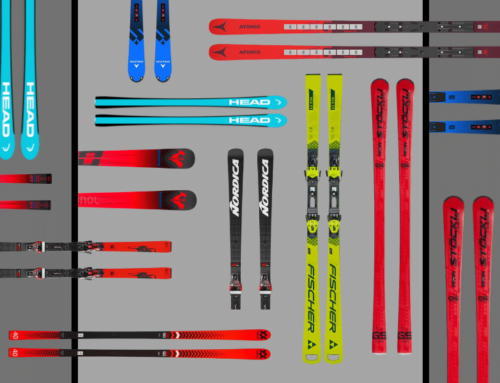The French team is rebuilding for the future
Johan Clarey final race Soldeu Andorra: Photo GEPA
Now that a generation of skiers who created the team’s recent storied history has retired, Équipe de France has been called upon to implement new solutions. The retirement of Tessa Worley, Johan Clarey, Nastasia Noens, Coralie Frasse-Sombet and Brice Roger will leave a large void in a French World Cup team, which is currently not particularly significant in size.

Retirements aside, the additional list of elite injured French skiers includes Victor Muffat-Jeandet, Romane Miradoli, Matthieu Bailet, Thibaut Favrot, Cyprien Sarrazin, Clarisse Brèche, Doriane Escané and Adrien Fresquet.
Notably, the 2022/2023 French results have been unremarkable because of their absence. Alexis Pinturault’s Gold and bronze at the World Champs and three World Cup podiums, Clément Noël’s two World Cup podiums, including a victory and one podium each for Laura Gauchè and Miradoli, have been relatively insignificant achievements compared to the recent glorious seasons when globes and medals were the standards for the spoiled French fans and media.
Alpine Skiing Director to “create new dynamics”
Beginning with his World Cup debut David Chastan has participated as a coach in the ascent of Alexis Pinturault. In his recently released biography, Pinturault credits Chastan for keeping him motivated and on the team, even after experiencing a long string of DNFs. Since 2015, Chastan has been the men’s team Head Coach but has now accepted the Alpine Skiing Director (DTA) role, a new position that hasn’t existed in the French organization. Chastan explains his new responsibilities: “The DTA’s mission is to care for the entire filière of alpine skiing, not only the European or World Cup teams. We must aggregate and find solutions, communicate with the regional teams, and create new dynamics. It’s a lot of work, but we want to build a new sport policy with high inclusion. Undoubtedly, listening to the grassroots will be vital.”
Chastan thinks the changes to the World Cup men’s team will also be beneficial: “The team can progress with a new person in my former role. I’ve been there for many years; fresh air can be positive. Top skiers were well supported and protected, sometimes even too isolated. We might want to create more exchanges, providing opportunities for less accomplished athletes to train and be inspired by more successful ones.”

Pinturault to continue with new staff and in new disciplines
“I’m used to being in the front line.” Being the most successful French skier isn’t new to Alexis Pinturault. “When there is talk about the men’s team, my name is always there, and when discussing the women’s team, it’s always been Tessa’s name. Now we will hear less about our women’s team. With the retirements, their team has no slalom or giant slalom athletes ranked in the top 30. The team has to start from zero; a new course is necessary.
Johan (Clarey) has also left a hole (in the men’s team), but on our side, we hope Mathieu (Faivre) will return and again be among the best and Victor (Muffat-Jeandet) and others to recover from injuries. These past months all eyes have been just on me and Clément (Noël), but we have fast men in our team and young talent is coming up.”
Now Pinturault is ready to test new Head skis after his signature skiing event at Courchevel called “Winter Legacy.” Pinturault’s going to face some changes in his private team: “We’ll have to replace Coach Nicolas (Thoule) and Head Coach Titou (Stéphane Quittet), who did an amazing job but opted for other projects. New coaching appointments should be finalized soon; my team organization won’t change much,” says the 32year-old who won Overall Globe a couple of seasons ago. Rumors indicate a coach could be Austrian, but Pinturault prefers shifting the discussion to other changes.
Pinturault is trading short skis for long
Pinturault announced during the World Champs he would no longer compete in slalom and instead ski in more downhill races. “I’m at a point in my career where I seek new motivation and challenges. I’ve achieved a lot thanks to slalom, even recently, but moving toward downhill is the right choice now. I won’t train much more with the French speed team because I already join them often, including at the summer camp in Ushuaia. This year I might also be training at Copper Mountain.”
Women’s team becomes “orphaned”
The A team counted on five skiers this year. The majority of them will not be returning next season. Worley, Frasse-Sombet, and Noens “were the core of our Tech World Cup team,” admits Lionel Pellicier, Head Coach of the women’s team. “We still haven’t received the budget for the next season, but I’d like to confirm the staff, including the coaches who worked with Tessa: Jean-Noël Martin, Pierre Guillot-Patrique, Vincent Blum. They know what is needed to compete at the top and can help our European Cup team take the next step.”
Tessa Worley won her first World Cup race in 2008 and has been the French women’s team leader for over ten years. “During 2021-22, I already felt that could be my last season. I always wanted to perform at my best, but that season I lived the races differently; I could enjoy the journey more. Obviously, I continued, and this past season I saw it clearly; it was my last. I’m glad I could live it this way, ending my career on my terms,” confesses Worley.
Worley’s message to the team
Besides Shiffrin, the 33-year-old from Les Grand-Bornand, with 16 victories and 36 podiums, two discipline season titles, and two World Championship golds, was the most decorated active GS skier. She’s aware that her retirement leaves a difficult gap to fill. “I think it must be accepted now (the French) not being among the best tech teams. There will be a big void, but despite not being so many, the remaining experienced skiers on the team and the younger athletes have a lot of potential. They should not be pushed too hard, burned out, to over-accelerate their progression.”
Despite planning to take some months off and not knowing what her next projects will be, Worley is willing to help her former team, “sharing with the coaches and the new generation a report, an analysis of all my years with the Federation.” As advice to those who remain, “The key is open communication, especially for the younger athletes. They need a continuous exchange and reshaping of planning, goals and strategy. They must feel the staff’s confidence and patience to reach their best level.”

Young talent emerging
One of the most promising skiers on the team is Marie Lamure, Junior World Champion in Alpine Combined in 2022, a three-time second run qualifier in World Cup and with a fourth place at the World Championships Parallel race.
The 22-year-old from Courchevel is “grateful to have skied with Nasta (Noens), Tessa and Coco (Frasse-Sombet), benefiting from their experience, especially this past season, when I joined the World Cup team regularly. It was a great season for me and I’m not worried about the next one. It feels strange to become “orphans” from our leaders, but we have a good team coming from the European Cup. We’ve grown up on the team together and have created strong relationships, on and off the snow. I became more popular after the World Champs, which has given me more motivation. Next season I aim to conquer good results, no longer just qualifying or getting to know the (WC) slopes.”
Patience required
Head Coach Pellicier is confident of seeing speed skier Laura Gauché continuing the level of this season’s results, during which she climbed onto her first World Cup podium. However, he also has to be patient with “three athletes in physical rehab, who got injured almost simultaneously at the beginning of March. Romane Miradoli (1994, WC speed and GS), Doriane Escané (1999, tech discipline, top 7 European Cup Overall), Clarisse Brèche (2001, tech disciplines). They should be back on skis by October.”
In the meantime, the other French women will ski between April and May at the Les Deux Alpes glacier. Still, it’s not sure they’ll be able to take advantage of the Autumn of Tignes slalom courses because of some access permits and snow shortage.
A planned September Ushuaia camp is on the calendar; however, Pellicier is cautious: “It depends on the budget. We’re still waiting for the race calendars, making planning even more difficult.”
“We’ll have to make choices,” says the Federation’s President
After serving the French Ski Federation for 15 years as National Technical Director, Fabien Saguez stepped into the role of President in June of 2022 after prevailing in a tough election battle. The 52-year-old from Chamonix doesn’t discuss the sport aspects: “I let the Technical Director Pierre Mignerey and the head coaches do that.” Still, he offers a clear picture of the French Federation’s financial challenges: “The 2023 budget was difficult. The figures are not final yet, but they will be negative. There are several reasons for that. Last summer, the snow conditions in Europe pushed us to fly many more people to South America. The cost of the training camps was much higher. Like other federations, we faced more expensive travel fees due to the increased prices of gas, energy, flights and hotels. Inflation generally increased all our costs.”
Looking at the current situation, it doesn’t seem the prices will decrease. “It will be tough; we will have to make choices because of the budget. We’ll have some financial limitations impacting all our disciplines.”
Investigating federal funding opportunities
However, Saguez is working on new ways to secure the necessary resources for the Fédération Française de Ski, FFS: “With such a difficult budget, we’ve started to rethink things and review processes, such as the modality we use to generate funding. We cannot focus only on one-shot commercial sponsors. One of my major goals is to find different solutions in French law and the French taxation system. We’re meeting with several politicians about finding ways to finance our organization in a more stable and stronger way.”
After the Courchevel Méribel World Champs 2023, on home soil, the FFS president describes his expectations for next year’s French events: a good income source for the Federation. “We’re in discussions with the FIS. We’ll count on the usual French events. However, concerning the race calendars, it’s important to us that they consider the RSA, the environmental and social responsibility. They must respect the environment and the people, athletes and staff, who should be allowed enough recovery time. There’s work to do in in this regard.”
The new season feels like it is just around the corner, so there is no time to lose before the French relaunch.





















